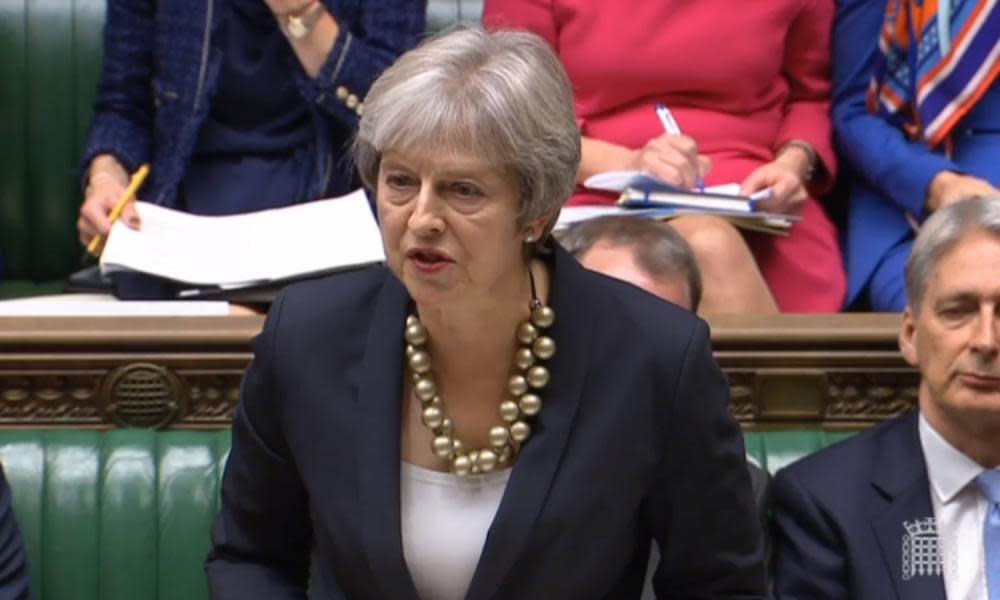May accentuates the positives and dazzles with confusion

No one could say they hadn’t been warned. At the same time the previous week, Theresa May had come to the Commons to explain why there wasn’t going to be any progress in the Brexit negotiations at the forthcoming EU summit in Brussels. Now she was back to report that she had been as good as her word and that there had indeed been no progress. It had been a matter of trust. The prime minister who delivered on her promises.
Not that this was quite how May sold her lack of achievements. Rather, she invited MPs to think of the withdrawal agreement as something that was 95% complete. Accentuate the positives. Think of it like a car. Instead of worrying about the fact that no one had yet managed to design a fully functioning engine, concentrate on the nice shiny leather seats, the top-of-the-range sound system and the wheels that were now more or less round. The squares that couldn’t quite be circled.
As expected, the final 5% was the Northern Ireland backstop, which the EU had managed to deceive the UK into signing last December by sprinkling magic dust in the government’s eyes so that no one bothered to read what they had signed up to. May was outraged that the EU had reservations about the UK’s insistence on reopening the negotiations.
Their lack of trust over our own proven untrustworthiness merely proved that they basically couldn’t be trusted. And because they were now asking for a backstop to a backstop, she was going to up the ante by demanding a backstop to a backstop to a backstop. Or something like that. Basically she had no idea how to resolve the matter but expected that sooner or later she would make some kind of compromise that she would try to pass off as a gain.
If the plan had been to dazzle with confusion, it certainly seemed to have been effective. Though some, like Jeremy Corbyn, are more easily confused than others. You’d have thought, given that May has basically made much the same statement on numerous occasions, that the Labour leader by now would have been able to put together a reply that cut through her lack of coherence. Yet the familiarity only seems to muddle him further. He failed to ask a single telling question and even managed to get wrong the gender and title of the Lithuanian president.
Corbyn wasn’t alone. The prime minister’s frailty and mediocrity – these days she barely makes an effort to conceal both her lack of faith in her own ability and her belief that Brexit is fundamentally a bad idea – seems to rub off on all those around her. Her very presence deadens all with which she comes in contact.
Her critics, so noisy and violent in the pages of the Sunday newspapers, lose their voice when forced into the public gaze. Boris Johnson and David Davis couldn’t even bring themselves to show up, and without their spiritual leaders the Brexiters were reduced to a near mindless rabble. So none of them appeared to notice that May had casually announced that the extension to the transition period – not that the UK would be needing it, obviously, she hastened to add – had been extended from a few months to over a year. Yet another Commons appearance that had been billed as potentially terminal for May had been turned into a non-event. There’s something to be said for boring people into submission.
Even those who hadn’t been rendered incapacitated by the prime minister’s inertia struggled to make much headway. Earlier in the day the junior Treasury minister John Glen had endured 30 minutes of personal humiliation as he was unable to answer a single question on how much extra the UK would pay for an extension to the transition, and when the same question was put to the prime minister she didn’t appear to have a clue either. The only difference was that she didn’t seem to find her ignorance in the slightest bit embarrassing. The advantage of having no empathy.
Nor did MPs from either side of the house have any luck when they tried to pin her down on a second referendum. What was the plan for when parliament inevitably rejected both her deal and a no-deal? May looked startled. She thought she had made herself clear. The plan was the same as it had always been. To have no plan at all. That way, nothing could possibly go wrong.

 Yahoo News
Yahoo News 
